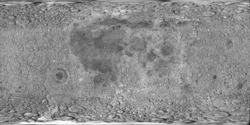Cratere Apollonius
Vai alla navigazione
Vai alla ricerca
| Cratere Apollonius | |
|---|---|
| Tipo | Crater |
| Satellite naturale | Luna |
 | |
| Dati topografici | |
| Coordinate | 4°30′36″N 60°57′36″E / 4.51°N 60.96°E |
| Maglia | LQ-13 (in scala 1:2.500.000) LAC-62 Mare Undarum (in scala 1:1.000.000) |
| Diametro | 50,7 km |
| Localizzazione | |
Apollonius è un cratere lunare di 50,66 km situato nella parte nord-orientale della faccia visibile della Luna.
Il cratere è dedicato al matematico greco Apollonio di Perga.
Crateri correlati[modifica | modifica wikitesto]
Alcuni crateri minori situati in prossimità di Apollonius sono convenzionalmente identificati, sulle mappe lunari, attraverso una lettera associata al nome.
| Apollonius | Coordinate | Diametro (in km) |
|---|---|---|
| A[1] | 4°49′12″N 56°51′00″E / 4.82°N 56.85°E | 24,55 |
| B[2] | 5°52′12″N 57°36′00″E / 5.87°N 57.6°E | 31,17 |
| E[3] | 4°20′24″N 61°51′36″E / 4.34°N 61.86°E | 16,55 |
| F[4] | 5°36′00″N 59°56′24″E / 5.6°N 59.94°E | 14,72 |
| H[5] | 3°25′48″N 59°30′36″E / 3.43°N 59.51°E | 19,04 |
| J[6] | 4°37′48″N 57°28′48″E / 4.63°N 57.48°E | 11,7 |
| L[7] | 6°28′12″N 54°34′12″E / 6.47°N 54.57°E | 10,12 |
| M[8] | 4°43′48″N 61°46′12″E / 4.73°N 61.77°E | 9,54 |
| N[9] | 4°45′00″N 63°46′12″E / 4.75°N 63.77°E | 10,79 |
| S[10] | 1°15′36″N 62°34′48″E / 1.26°N 62.58°E | 16,22 |
| U[11] | 4°53′24″N 59°52′12″E / 4.89°N 59.87°E | 8,44 |
| V[12] | 4°23′24″N 58°13′12″E / 4.39°N 58.22°E | 14,97 |
| X[13] | 6°54′00″N 58°10′48″E / 6.9°N 58.18°E | 28,97 |
| Y[14] | 4°52′48″N 62°36′00″E / 4.88°N 62.6°E | 8,71 |
Note[modifica | modifica wikitesto]
- ^ (EN) Apollonius A, su Gazetteer of Planetary Nomenclature, United States Geological Survey. URL consultato il 12 giugno 2020.
- ^ (EN) Apollonius B, su Gazetteer of Planetary Nomenclature, United States Geological Survey. URL consultato il 12 giugno 2020.
- ^ (EN) Apollonius E, su Gazetteer of Planetary Nomenclature, United States Geological Survey. URL consultato il 12 giugno 2020.
- ^ (EN) Apollonius F, su Gazetteer of Planetary Nomenclature, United States Geological Survey. URL consultato il 12 giugno 2020.
- ^ (EN) Apollonius H, su Gazetteer of Planetary Nomenclature, United States Geological Survey. URL consultato il 12 giugno 2020.
- ^ (EN) Apollonius J, su Gazetteer of Planetary Nomenclature, United States Geological Survey. URL consultato il 12 giugno 2020.
- ^ (EN) Apollonius L, su Gazetteer of Planetary Nomenclature, United States Geological Survey. URL consultato il 12 giugno 2020.
- ^ (EN) Apollonius M, su Gazetteer of Planetary Nomenclature, United States Geological Survey. URL consultato il 12 giugno 2020.
- ^ (EN) Apollonius N, su Gazetteer of Planetary Nomenclature, United States Geological Survey. URL consultato il 12 giugno 2020.
- ^ (EN) Apollonius S, su Gazetteer of Planetary Nomenclature, United States Geological Survey. URL consultato il 12 giugno 2020.
- ^ (EN) Apollonius U, su Gazetteer of Planetary Nomenclature, United States Geological Survey. URL consultato il 12 giugno 2020.
- ^ (EN) Apollonius V, su Gazetteer of Planetary Nomenclature, United States Geological Survey. URL consultato il 12 giugno 2020.
- ^ (EN) Apollonius X, su Gazetteer of Planetary Nomenclature, United States Geological Survey. URL consultato il 12 giugno 2020.
- ^ (EN) Apollonius Y, su Gazetteer of Planetary Nomenclature, United States Geological Survey. URL consultato il 12 giugno 2020.
Altri progetti[modifica | modifica wikitesto]
 Wikimedia Commons contiene immagini o altri file sul Apollonius
Wikimedia Commons contiene immagini o altri file sul Apollonius
Collegamenti esterni[modifica | modifica wikitesto]
- (EN) Cratere Apollonius, su Gazetteer of Planetary Nomenclature, United States Geological Survey.
- (EN) Immagini del Cratere Apollonius, in Atlante fotografico orbitale della Luna, Lunar and Planetary Institute.

